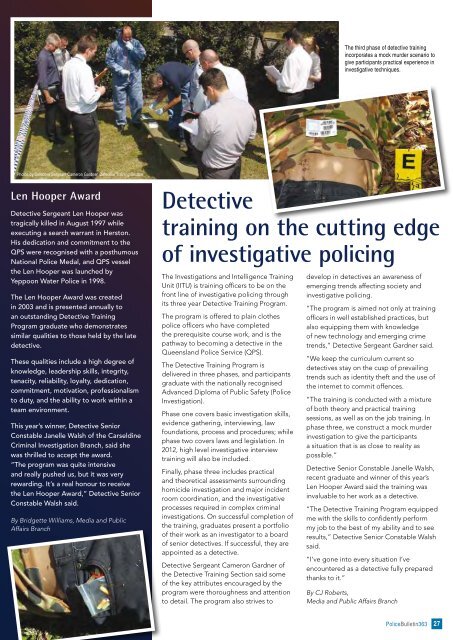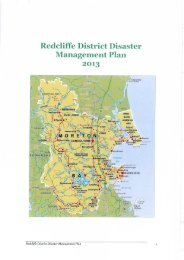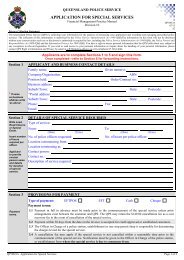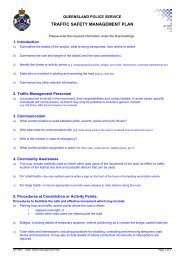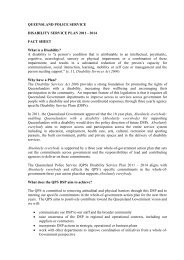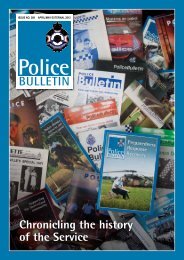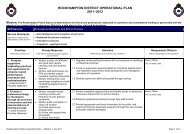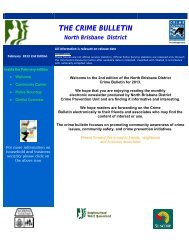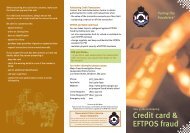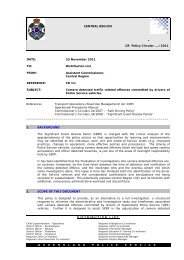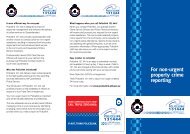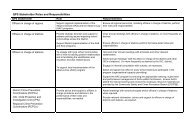Training Command - Queensland Police Service - Queensland ...
Training Command - Queensland Police Service - Queensland ...
Training Command - Queensland Police Service - Queensland ...
You also want an ePaper? Increase the reach of your titles
YUMPU automatically turns print PDFs into web optimized ePapers that Google loves.
The third phase of detective training<br />
incorporates a mock murder scenario to<br />
give participants practical experience in<br />
investigative techniques.<br />
Photos by Detective Sergeant Cameron Gardner, Detective <strong>Training</strong> Section<br />
Len Hooper Award<br />
Detective Sergeant Len Hooper was<br />
tragically killed in August 1997 while<br />
executing a search warrant in Herston.<br />
His dedication and commitment to the<br />
QPS were recognised with a posthumous<br />
National <strong>Police</strong> Medal, and QPS vessel<br />
the Len Hooper was launched by<br />
Yeppoon Water <strong>Police</strong> in 1998.<br />
The Len Hooper Award was created<br />
in 2003 and is presented annually to<br />
an outstanding Detective <strong>Training</strong><br />
Program graduate who demonstrates<br />
similar qualities to those held by the late<br />
detective.<br />
These qualities include a high degree of<br />
knowledge, leadership skills, integrity,<br />
tenacity, reliability, loyalty, dedication,<br />
commitment, motivation, professionalism<br />
to duty, and the ability to work within a<br />
team environment.<br />
This year’s winner, Detective Senior<br />
Constable Janelle Walsh of the Carseldine<br />
Criminal Investigation Branch, said she<br />
was thrilled to accept the award.<br />
“The program was quite intensive<br />
and really pushed us, but it was very<br />
rewarding. It’s a real honour to receive<br />
the Len Hooper Award,” Detective Senior<br />
Constable Walsh said.<br />
By Bridgette Williams, Media and Public<br />
Affairs Branch<br />
Detective<br />
training on the cutting edge<br />
of investigative policing<br />
The Investigations and Intelligence <strong>Training</strong><br />
Unit (IITU) is training officers to be on the<br />
front line of investigative policing through<br />
its three year Detective <strong>Training</strong> Program.<br />
The program is offered to plain clothes<br />
police officers who have completed<br />
the prerequisite course work, and is the<br />
pathway to becoming a detective in the<br />
<strong>Queensland</strong> <strong>Police</strong> <strong>Service</strong> (QPS).<br />
The Detective <strong>Training</strong> Program is<br />
delivered in three phases, and participants<br />
graduate with the nationally recognised<br />
Advanced Diploma of Public Safety (<strong>Police</strong><br />
Investigation).<br />
Phase one covers basic investigation skills,<br />
evidence gathering, interviewing, law<br />
foundations, process and procedures; while<br />
phase two covers laws and legislation. In<br />
2012, high level investigative interview<br />
training will also be included.<br />
Finally, phase three includes practical<br />
and theoretical assessments surrounding<br />
homicide investigation and major incident<br />
room coordination, and the investigative<br />
processes required in complex criminal<br />
investigations. On successful completion of<br />
the training, graduates present a portfolio<br />
of their work as an investigator to a board<br />
of senior detectives. If successful, they are<br />
appointed as a detective.<br />
Detective Sergeant Cameron Gardner of<br />
the Detective <strong>Training</strong> Section said some<br />
of the key attributes encouraged by the<br />
program were thoroughness and attention<br />
to detail. The program also strives to<br />
develop in detectives an awareness of<br />
emerging trends affecting society and<br />
investigative policing.<br />
“The program is aimed not only at training<br />
officers in well established practices, but<br />
also equipping them with knowledge<br />
of new technology and emerging crime<br />
trends,” Detective Sergeant Gardner said.<br />
“We keep the curriculum current so<br />
detectives stay on the cusp of prevailing<br />
trends such as identity theft and the use of<br />
the internet to commit offences.<br />
“The training is conducted with a mixture<br />
of both theory and practical training<br />
sessions, as well as on the job training. In<br />
phase three, we construct a mock murder<br />
investigation to give the participants<br />
a situation that is as close to reality as<br />
possible.”<br />
Detective Senior Constable Janelle Walsh,<br />
recent graduate and winner of this year’s<br />
Len Hooper Award said the training was<br />
invaluable to her work as a detective.<br />
“The Detective <strong>Training</strong> Program equipped<br />
me with the skills to confidently perform<br />
my job to the best of my ability and to see<br />
results,” Detective Senior Constable Walsh<br />
said.<br />
“I’ve gone into every situation I’ve<br />
encountered as a detective fully prepared<br />
thanks to it.”<br />
By CJ Roberts,<br />
Media and Public Affairs Branch<br />
<strong>Police</strong>Bulletin363 27


